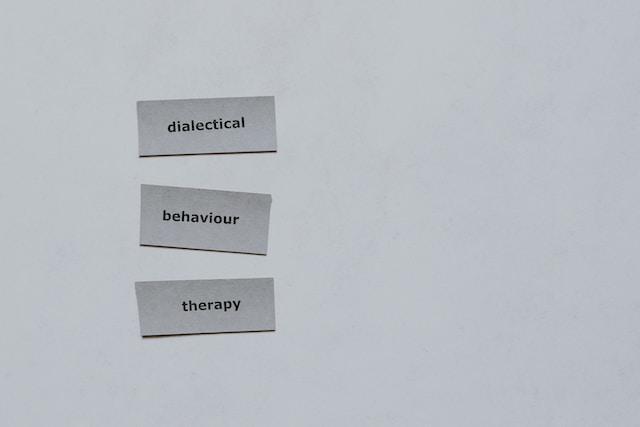Journey to Self-Discovery: DBT London's Thoughtful Treatment
Journey to Self-Discovery: DBT London's Thoughtful Treatment
Blog Article
Taking Advantage Of the Power of Dialectical Practices Therapy (DBT) Providers for Sustainable Emotional Balance and Improved Relationships
In a globe where psychological health and preserving healthy relationships are essential components of a meeting life, the usage of Dialectical Behavior Treatment (DBT) solutions has arised as a beacon of hope for many people. The evidence-based and organized method of DBT uses a pathway in the direction of sustainable psychological balance and boosted communications with others.
Understanding the Core Principles of DBT
Dialectical Habits Therapy (DBT) is started upon a set of core principles that underpin its healing technique to advertising psychological equilibrium and emotional health. Mindfulness is another core principle of DBT, focusing on being totally existing in the minute without judgment.
Validation is additionally important to DBT, stressing the significance of approving and acknowledging one's experiences and feelings as valid. With validation, individuals can learn to browse their sensations with concern and understanding, promoting self-acceptance and emotional development. Lastly, plays a critical function in DBT, highlighting the alteration of maladaptive actions with reinforcement and skill-building. By integrating these core principles into treatment, DBT offers a extensive and reliable method to advertising emotional well-being and emotional durability. DBT London.
Creating Emotional Guideline Abilities
Emotional guideline abilities are vital parts of Dialectical Behavior Treatment (DBT) that make it possible for people to effectively handle their emotions and navigate challenging scenarios with strength. These skills encompass the ability to determine and recognize one's emotions, endure distress, control intense sensations, and act based on individual values also despite psychological chaos. Developing emotional guideline skills involves learning mindfulness strategies to remain present in the minute, understanding the triggers that result in emotional dysregulation, and executing coping approaches to modulate psychological responses.

Through DBT solutions, people can cultivate a much deeper understanding of their emotions, recognize patterns of habits that contribute to emotional distress, and acquire functional tools to manage their feelings constructively. By refining these skills, individuals can boost their emotional intelligence, improve impulse control, and foster much healthier relationships. Ultimately, mastering emotional law leads to higher psychological security, enhanced positive self-image, and an increased ability to browse life's difficulties with composure and adaptability.
Enhancing Interpersonal Performance

One secret element of improving interpersonal performance in DBT is finding out to acknowledge and manage feelings in social communications (DBT London). By boosting psychological recognition, individuals can react to others in a much more compassionate and understanding means. Additionally, DBT stresses the significance of exercising mindfulness in interpersonal relationships, urging individuals to be present in their interactions and fully engage with others

Exercising Mindfulness Techniques
Establishing a consistent mindfulness method is important for individuals undertaking Dialectical Behavior modification (DBT) to grow emotional guideline and enhance their interpersonal efficiency. Mindfulness techniques, a core component of DBT, involve paying interest to the here and now minute without judgment. With mindfulness, people can end up being more familiar with their ideas, feelings, and physical experiences, allowing them to react to situations with higher clearness and control.

Another important element of practicing mindfulness in DBT is the idea of extreme acceptance. here are the findings Radical acceptance includes totally embracing truth as it is, also when it is excruciating or hard. By accepting the present moment without judgment, people can reduce their suffering and include positive modification.
Applying DBT Strategies in Every Day Life
Structure upon the foundation of mindfulness techniques such as reflection and extreme approval, individuals can integrate DBT strategies into their every day lives to promote psychological equilibrium and boost their social abilities. One efficient DBT technique is using dialectics, which urges people to locate the happy medium between 2 opposing feelings or thoughts. By exercising dialectics in everyday interactions, people can discover to verify their own sensations while additionally taking into consideration the viewpoints of others. An additional vital DBT ability for every day life is distress resistance, which includes discovering just how to deal with extreme feelings without resorting to dangerous actions. This can be achieved via strategies such as self-soothing tasks, interruption methods, or enhancing the minute. In addition, interpersonal effectiveness skills showed in DBT can aid individuals communicate their needs assertively, set limits, and keep healthy partnerships. By regularly applying these DBT methods in day-to-day live, people can experience sustainable psychological equilibrium and improve their total health.
Final Thought
To conclude, harnessing the power of Dialectical Behavior Therapy (DBT) services can bring about sustainable emotional equilibrium and enhanced connections. DBT London. By recognizing the core principles of DBT, developing emotional policy skills, boosting social efficiency, practicing mindfulness methods, and applying DBT methods in life, individuals can experience significant renovations in their total well-being and relationships. The alternative strategy of this article DBT uses important tools and techniques for managing feelings and building healthier connections with others
Emotional guideline skills are important components of Dialectical Actions Treatment (DBT) that make it possible for people to successfully manage their emotions and navigate challenging circumstances with strength.With DBT services, individuals can cultivate a deeper recognition of their emotions, identify patterns of behavior that add to psychological distress, and acquire functional tools to manage their sensations constructively.Establishing a consistent mindfulness practice is important for individuals undergoing Dialectical Behavior Therapy (DBT) to grow emotional regulation and improve their social performance.Building upon the structure of mindfulness strategies such as reflection and extreme approval, individuals can incorporate DBT approaches right into their everyday lives to cultivate emotional balance and improve their social skills. By recognizing the core concepts of DBT, establishing psychological policy skills, enhancing interpersonal efficiency, practicing mindfulness methods, and applying DBT techniques in daily life, people can experience significant improvements in their overall well-being and relationships.
Report this page